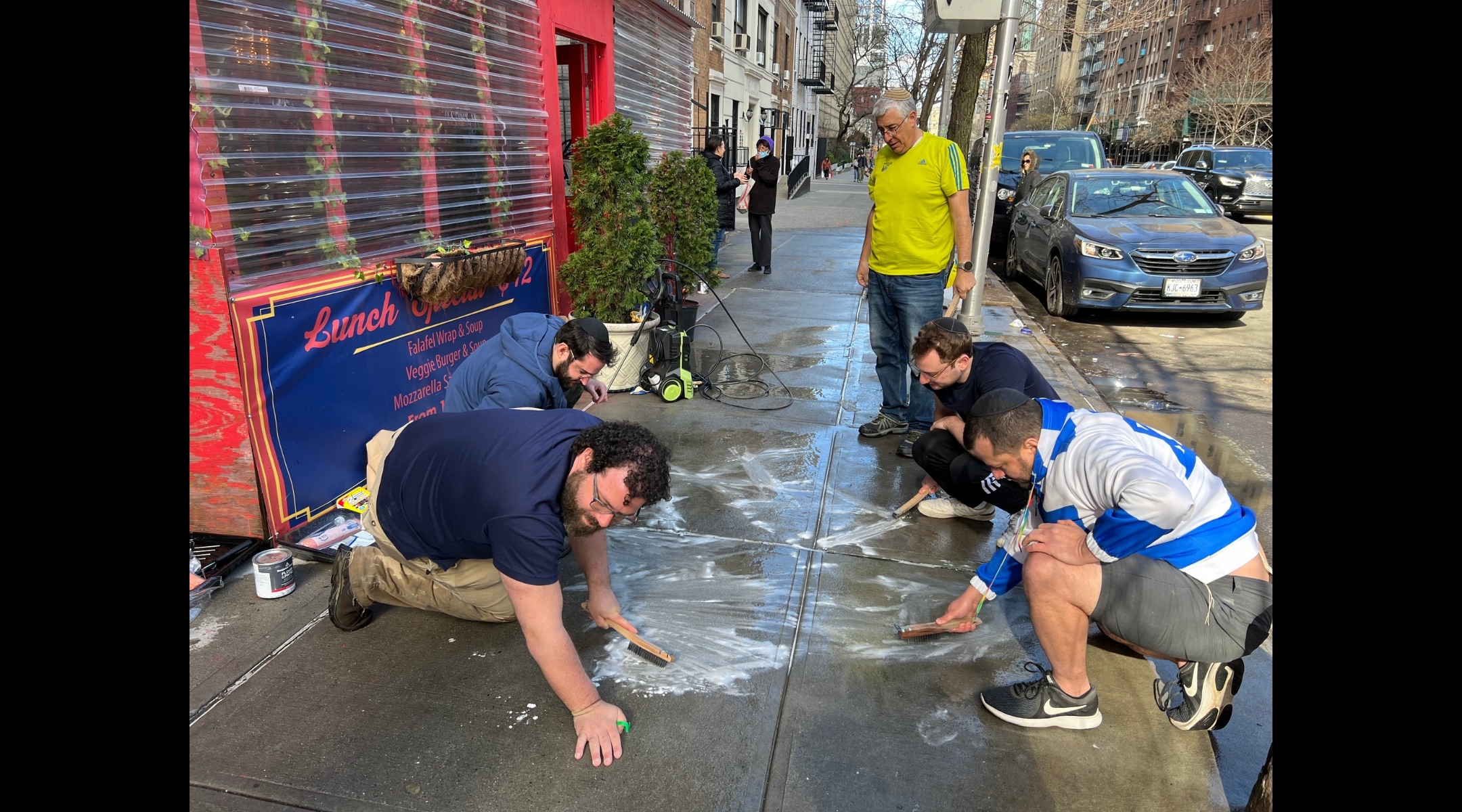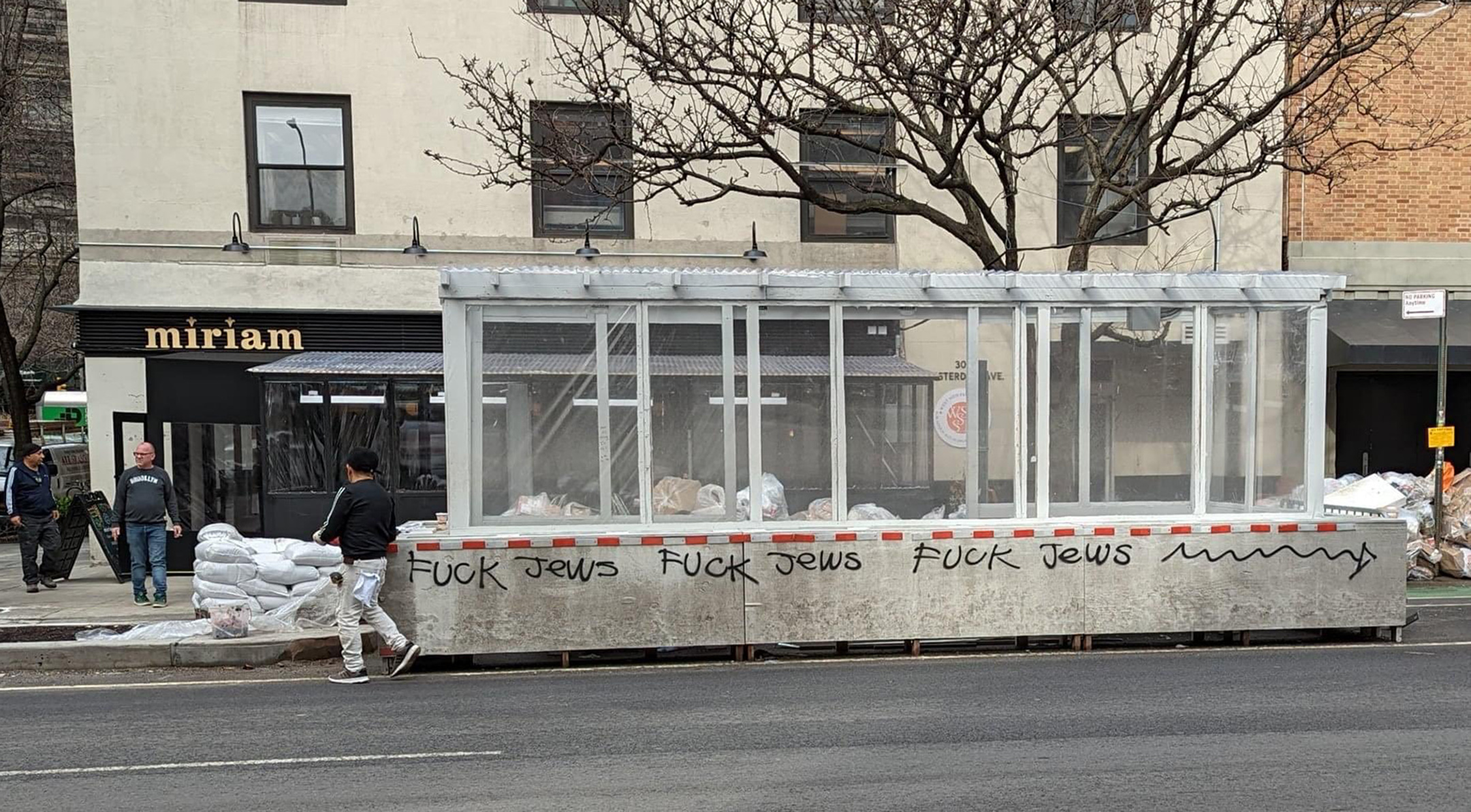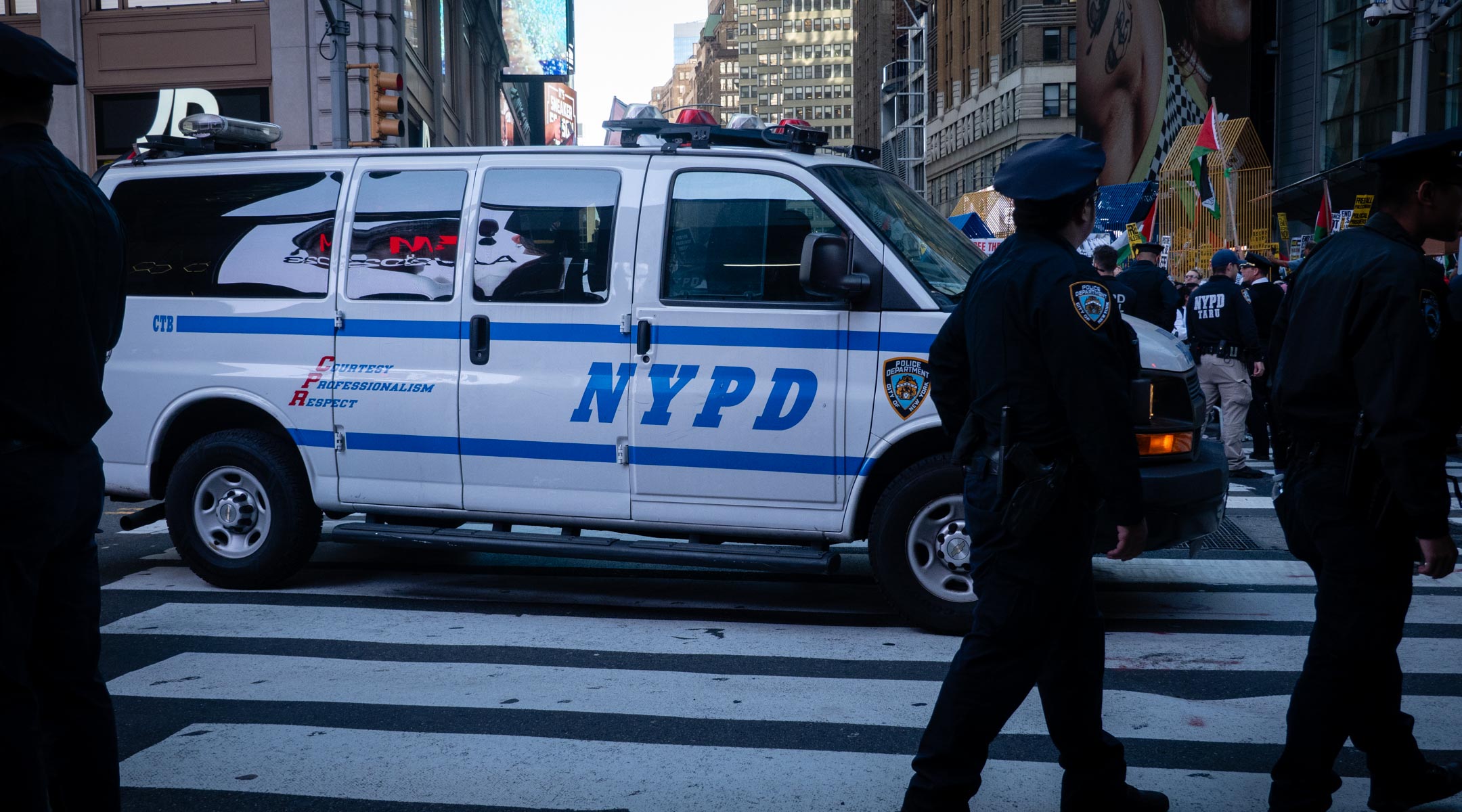(New York Jewish Week) — Last month, antisemitic graffiti was found on bathroom walls at Queens College, including the message “Hitler, please come back.” In response, the NYPD alerted its Hate Crimes Task Force, although graffiti and a range of other crimes are not among the 66 offenses that can be considered hate crimes.
Gov. Kathy Hochul is trying to change that.
In January, during her State of the State address, Hochul said she aimed to add another 31 offenses to the list of potential hate crimes, citing increases in antisemitism and Islamophobia. On Monday, the governor, a centrist Democrat, said passing the hate crimes legislation was part of an agreement she had reached with legislative leaders in negotiations over the state budget. The legislation passed the State Assembly on Thursday and now heads to the State Senate.
“The rising tide of hate is abhorrent and unacceptable, and I’m committed to doing everything in my power to keep New Yorkers safe,” Hochul said in January. “We will never rest until all New Yorkers feel safe, regardless of who they are, who they love or how they worship.”
The expansion of the hate crimes law comes as Jewish organizations and lawmakers have demanded action amid a reported spike in antisemitism following Oct. 7. While many Jewish groups are cheering the additions, some fear that they encourage sending even more people to prison. And one criminal justice professor questioned whether adding offenses to the list will actually deter some would-be perpetrators of minor offenses.
“Essentially for hate crimes we’re making the penalties more severe, and there’s been a whole lot of hate lately so I think this is a good thing,” said Bronx Assemblyman Jeffrey Dinowitz, a Jewish Democrat who has pushed for the expansion. “The numbers were way too high before Oct. 7, but since Oct. 7 the problem’s gotten so much worse.”
Law enforcement agencies and watchdogs have reported that since the outbreak of the Israel-Hamas war on Oct. 7, antisemitism has spiked in New York and across the country. According to NYPD data, between the start of October and April 1, there were 253 antisemitic incidents reported to police, nearly double the number during the same period last year. An Anti-Defamation League audit released on Tuesday said antisemitic incidents more than doubled nationwide year over year, also increasing in New York.
In November, Dinowitz and a group of other lawmakers sponsored bills in the State Senate and Assembly that would have made severe criminal offenses like gang assault, rape and murder prosecutable as hate crimes. They also included lesser offenses like graffiti and “jostling,” a crime similar to pickpocketing.
“Hate crimes harm not just the victim, but the larger community. It is important that this statute is amended to more effectively remediate such crimes’ pervasive harm,” the legislation says.
Designating an offense as a hate crime leads to a steeper punishment. Arson as a hate crime could result in a 15-year imprisonment, as opposed to 10 years for regular arson, according to Frank Pezzella, a professor at New York’s John Jay College of Criminal Justice. Dinowitz said the legislation would “essentially raise the crime one notch,” making a class D felony into a class C felony, for example.
The crimes are considered more serious, Pezzella said, because they threaten a larger community beyond their immediate targets. Whether something is a hate crime depends on proving the perpetrator’s motivation, which can be “a very high bar” to prove in court, Pezzella said.
“It’s not just the primary victims we’re concerned about, it’s a message to secondary victims and how it undermines the ideals of society and inclusiveness,” he said. “That’s why hate crimes are dealt with a lot more severely than their ordinary crime counterparts.”

Volunteers scrub graffiti from the sidewalk scrawled outside of Effy’s Café, a kosher restaurant on the Upper West Side, in February 2024. (Jackie Hajdenberg)
Despite Hochul’s support of the bill in January, the bill stalled, and did not come before the Senate or Assembly until Thursday’s budget proceedings.
But now a version of the legislation is due to pass with the state budget, Dinowitz said. The $237 billion budget is more than two weeks past its April 1 deadline and awaiting approval from the legislature. Hochul’s office said the legislature would vote on the bill in the coming days before coming to the governor for her signature.
According to the budget deal, 23 crimes will be added under hate crimes, including gang assault, aggravated murder and sexual abuse — though graffiti is still off the list. The budget also includes $35 million for the state’s Securing Communities Against Hate Grant, which protects houses of worship and religious schools.
Dinowitz said some crimes, such as graffiti, had been dropped from the legislation in order to secure a “broad consensus.”
“I don’t think there’s any real opposition. I think there are some people on principle who don’t want to put more people in jail,” Dinowitz said.
Among those people are some progressive Jewish activists who say the bill will contribute to mass incarceration. Jews for Racial and Economic Justice, a progressive group based in New York City, said it was tracking the bill along with allied non-Jewish groups. Sophie Ellman-Golan, a spokesperson for JFREJ, said the offenses in the legislation are already crimes, and feels that the bill would only enhance existing punishments in a harmful way.
“Something like this can be a way for politicians to put a Band-Aid on and say, ‘Look how seriously we take hate violence,’” Ellman-Golan said, arguing that education was a more effective preventative measure. “A higher sentence is not materially going to undo what has been done. It simply causes further harm.”
But major Jewish groups in the city, including the UJA-Federation, Anti-Defamation League and Jewish Community Relations Council, backed Hochul’s January announcement. UJA’s CEO, Eric Goldstein, called the hate crimes expansion “a critical tool for law enforcement and the courts.”
JCRC-NY’s CEO, Mark Treyger, said he supports the bill as a means to “hold bad actors accountable.” He urged a “comprehensive approach” to reducing hate crimes, that included legal penalties as well as other measures such as mental health care.
“When we say there’s no room for hate, we have to mean it with more than just tweets and Facebook posts. We have to see that language codified into law,” Treyger said.

Miriam, an Israeli restaurant on the Upper West Side, is shown after it was vandalized with antisemitic graffiti, Feb. 17, 2022. (Twitter)
Richard Priem, the interim CEO of the Community Security Service, which coordinates security for synagogues and other Jewish institutions, said his group was not involved in legislative advocacy and could not comment on the specifics of the bill, but that the group generally supported cracking down on antisemitic incidents. Because “not every antisemitic incident is also a crime,” Priem said, it can be more difficult for law enforcement to take action.
“If legislation is passed that makes more expressions that are perceived as antisemitic an offense, that is a good thing,” he said. “There’s a stronger impetus for law enforcement to respond to it, which is making us safer.”
Manhattan District Attorney Alvin Bragg, who has stepped up prosecution of hate crimes after coming under fire for his handling of a 2021 attack on a Jewish man, also vocally supported Hochul’s January announcement.
“Hate and bias motivated crimes are continuing to infiltrate our communities, leaving New Yorkers vulnerable and threatening public safety as a whole,” Bragg said in January, adding that the legislation is part of “creating a more robust legal framework and giving us the tools necessary to ensure the safety and well-being of all New Yorkers.”
Pezzella said he was “surprised” that certain crimes, such as arson, are not already on the hate crimes list. But he questioned whether the expanded definition would actually dissuade those who would commit more minor hate offenses. He said most hate crimes are done by “thrill seekers,” mainly young people who may not understand the significance of tagging a synagogue with graffiti, for example. Most offenders are not “looking at how the law has changed,” he said.
“Who’s doing graffiti?” he said. “It’s not 35-year-old adults, it’s probably kids. If they don’t know then essentially that type of intervention may or may not work.”
He believes hate incidents are vastly underreported, something Jewish organizations have also said. Pezzella added that even minor incidents that don’t amount to a crime, such as verbal harassment, should be reported to law enforcement so officers can recognize patterns and keep an eye out during patrols because “hate incidents are precursors to hate crimes.”
Pezzella said law enforcement had a central role to play in combating hate crimes, but also called for more education and public awareness campaigns.
“We need to get at the would-be offenders, people who think that it’s OK to tag a synagogue,” he said. “They need to know that the vast majority of the public doesn’t tolerate this kind of offense.”
The New York Jewish Week brings you the stories behind the headlines, keeping you connected to Jewish life in New York. Help sustain the reporting you trust by donating today.





